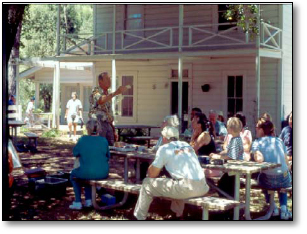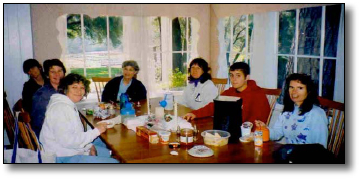So you're thinking of becoming a volunteer? What if I were to tell you that volunteering has the potential to positively change your life and those with whom you come into contact. "Yeah, right," (with eyes rolling) may be the most common response to such an outlandish promise. But becoming a volunteer has just that potential. Let me explain.
First of all, according to research taking place at the Institute for the Advancement of Health, doing regular volunteer work increases life expectancy. According to their studies, that "feeling of warmth that results from helping others" may be a symptom of endorphins being released in the brain, which, in turn, can lead to bolstering the immune system. We all know that a healthy immune system can lead to a longer life. In addition, according to researchers at the University of California Medical School in San Francisco, volunteering "seems to increase self-esteem, foster a sense of competence, and fight off stress and depression." So it seems that volunteers live a healthier, happier, and longer life than the rest of the population.
John F. Kennedy once said, "I am certain that after the dust of centuries has passed over our cities, we, too, will be remembered, not for victories or defeats in battle or in politics, but for our contribution to the human spirit." As a volunteer docent, you have the potential for that kind of contribution: a gift of your knowledge and enthusiasm for bettering your community. Volunteers have the potential to promote understanding, touch a heart, and make a difference.
 As a Quail Hollow Ranch County Park volunteer or docent, you will learn about a diverse natural and cultural history, how to share that information with the public, how to improve the resources of the park, and meet people who have similar interests. As a volunteer you will help improve the health of the natural and cultural resources through work on park projects. As a docent, you will have the chance to positively influence a visitor's experience, to instill an appreciation for the natural world and the colorful history of the park. And as you convince visitors of the specialness of this place, you gain that same gift back again through its reinforcement.
As a Quail Hollow Ranch County Park volunteer or docent, you will learn about a diverse natural and cultural history, how to share that information with the public, how to improve the resources of the park, and meet people who have similar interests. As a volunteer you will help improve the health of the natural and cultural resources through work on park projects. As a docent, you will have the chance to positively influence a visitor's experience, to instill an appreciation for the natural world and the colorful history of the park. And as you convince visitors of the specialness of this place, you gain that same gift back again through its reinforcement.
Within the 300 acres that make up Quail Hollow Ranch are 15 plant communities, several of which are sensitive habitat, and all of which contain 17 species of special concern. These habitats include sand parkland, ponderosa pine forest, knobcone pine stands, willow and oak riparian forests, pond, grassland, mixed evergreen forests, redwood forest, dwarf redwood forest, mixed chaparral, maritime chaparral, and maritime scrub. Human history at Quail Hollow spans the Ohlone culture, through the Mexican and early American settlers, emphasizing the Lane family era (of Sunset Magazine fame), and ending with the local political fight to protect the area from development.
From the quaint pond at the foot of the historic ranch buildings, to the scenic overlook of the San Lorenzo Valley and beyond to Monterey, Quail Hollow Ranch County Park offers visitors an opportunity to learn and appreciate our unique natural wonders and cultural heritage. And your willingness to share can enhance the vehicle of that discovery.
What is a Volunteer Docent?
Webster's dictionary defines a docent as a university instructor not on the regular faculty. California State Parks describes them as "a walking, talking goldmine of information". As a Quail Hollow Ranch volunteer docent, your intimate knowledge of the park gained through training, exploring the resources, and through your own outside interests will afford you an ability to improve the parks natural habitats and help visitors understand and appreciate the park's intrinsic beauty and uniqueness. More specifically, docents could participate in any or all of the following activities:
- Plan, organize, and present interpretive programs on the natural and cultural history of the park to the general public.
- Host the visitor center and ranch buildings by providing basic information of park facilities, the area's natural and cultural history, and park rules to visitors.
- Rove along the park trails, surveying the flora and fauna and providing park information to visitors.
- Assist in the development, preparation, and/or research of interpretive projects like pamphlets, brochures, displays, and maps.
- Assist with exotic plant removal, basic trail maintenance, and other resource projects.
 Docents and volunteers are required to participate in the entire docent training program, attend volunteer meetings, and donate a total of at least 60 hours for a period of at least one year. In return for your commitment, you will receive a t-shirt, nametag, docent manual, and Quail Hollow pin. Continuing education through enrichment sessions, field trips, and excursions will give you a broader base of knowledge to share with your audiences. Opportunities to keep in touch with fellow docents will be enjoyed through social gatherings, meetings, and continuing education. Finally, becoming a Quail Hollow Ranch volunteer or docent will also give you the chance to make a difference in your community as well as meet people who share your interests.
Docents and volunteers are required to participate in the entire docent training program, attend volunteer meetings, and donate a total of at least 60 hours for a period of at least one year. In return for your commitment, you will receive a t-shirt, nametag, docent manual, and Quail Hollow pin. Continuing education through enrichment sessions, field trips, and excursions will give you a broader base of knowledge to share with your audiences. Opportunities to keep in touch with fellow docents will be enjoyed through social gatherings, meetings, and continuing education. Finally, becoming a Quail Hollow Ranch volunteer or docent will also give you the chance to make a difference in your community as well as meet people who share your interests.
Conclusion
Those who are involved with the programs and projects at Quail Hollow Ranch have a unique opportunity to explore this special park in ways that others do not. As you discover its exceptional qualities, your experiences will add to your growing collection of knowledge and to your appreciation for the park.
Sharing what you have learned can lead to that breakthrough discovery that was mentioned earlier. That discovery has to do with giving up a little of your time, talent, and energy for the betterment of someone or something else. As you give away these intangibles, a funny thing happens: they return to you in greater quantity. And the best things worth having are the ones that grow within you as you give them away – things like knowledge, love, enthusiasm, health, and yes, sometimes even time.
Still not convinced? Maybe the words of the late Erma Bombeck will convince you of the magnitude of possibility of which you are on the threshold:
"Volunteers are like yachts. No matter where they are, they arouse your curiosity. Who are they? Where do they come from? Why are they here? They could stay moored where it's safe and still justify their being, but they choose to cut through the rough waters, ride out storms, and take chances. They have style. They're fiercely independent. If you have to ask how much they cost, you can't afford them.
"Volunteers and yachts have a lot more in common these days. They're both a part of an aristocratic era that is disappearing from the American Scene. They're both a luxury in a world that has become very practical. Day by day, the number of volunteers decreases in this country as more and more of them equate their worth in terms of dollars and cents.
"Three years ago I did a column on volunteers in an effort to point out that they don't contribute to our civilization. They are civilization – at least the only part worth talking about. They are the only human beings on the face of this earth who reflect this nation's compassion unselfishness, caring, patience, need, and just plain loving one another. Their very presence transcends politics, religion, ethnic background, marital status, sexism, even smokers vs. non-smokers.
"Maybe, like the yacht, the volunteer was a luxury. And luxuries are too often taken for granted. One has to wonder. Did we as a nation, remember to say to the volunteers, thank you for our symphony hall. Thank you for the six dialysis machines. Thank you for the hot chocolate at the scout meeting. Thanks for reading to the blind. Thanks for knocking on doors in the rain. Thanks for hugging the winners of the Special Olympics. Thanks for pushing the wheelchair into the sun. Thanks for being.
"Did the media stand behind them when they needed a boost? Did the professionals make it a point to tell them they did a good job? Did the recipients of their time and talent even express their gratitude?
"It frightens me, somehow, to imagine what the world would be like without them."